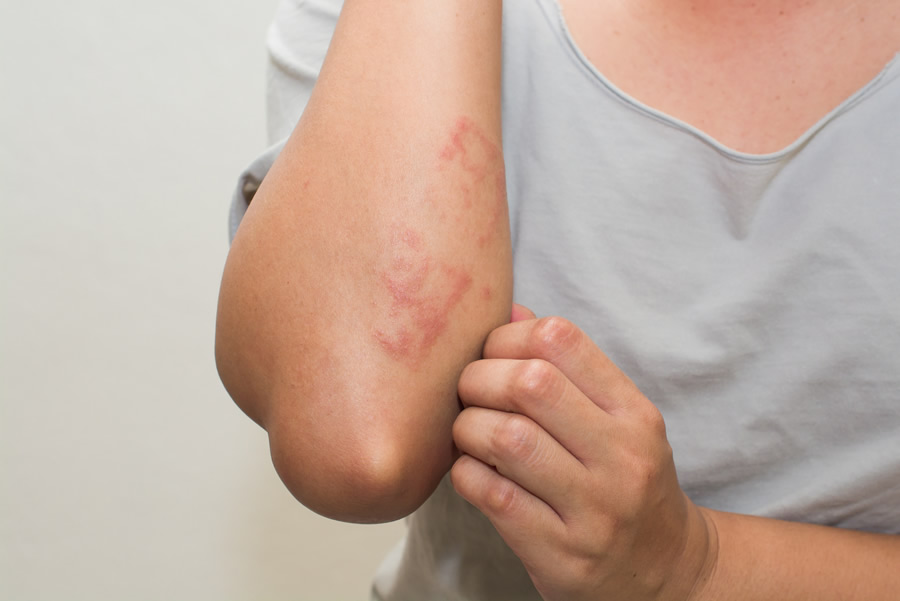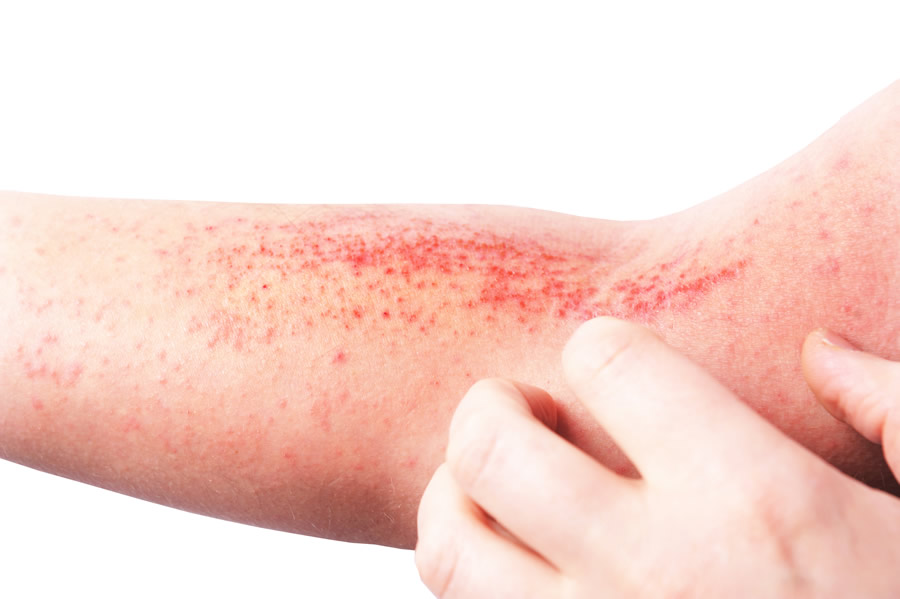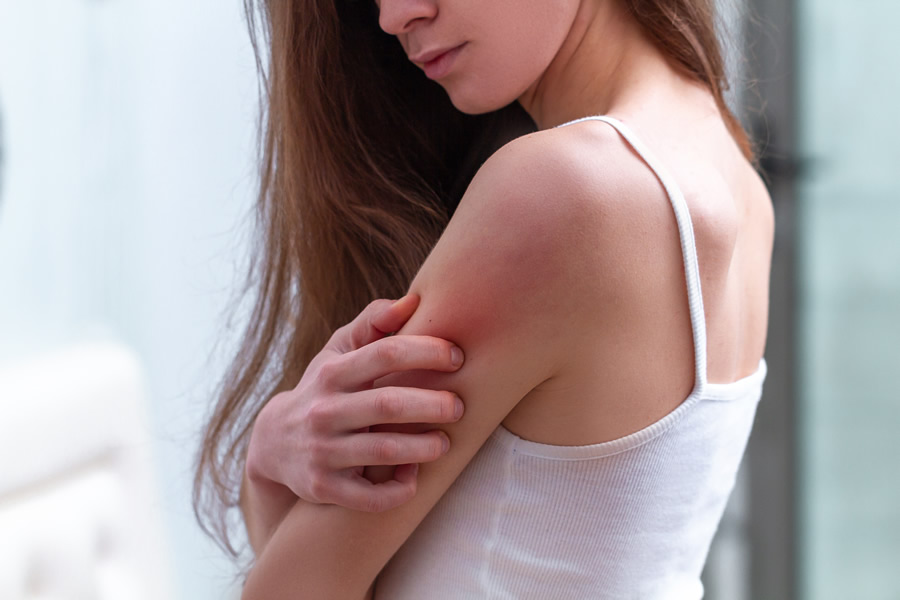Eczema (Atopic Dermatitis)
Atopic Dermatitis, more commonly known as eczema, is a skin condition where the skin becomes dry, itchy and red. Though this skin disease is more common in children, initial and chronic flare-ups can occur at any age: a study by the American Academy of Dermatology shows that 1-3% of adults deal with symptoms of eczema, and about 20% of children.
Eczema is linked to the immune system, similar to other atopic diseases like hay fever and asthma. Though most cases of eczema are mild, symptoms from eczema flares can impact quality of life, and severe eczema can sometimes impede regular daily activity. Dr. Michele Green is a board-certified dermatologist who is here to provide you with eczema treatment options that target symptoms and help keep your eczema symptoms at bay.

Eczema Symptoms
Atopic dermatitis symptoms vary greatly from patient to patient, but, generally, eczema is identified by red patches of skin on affected areas. Though different severities or types of eczema vastly affect eczema symptoms, additional symptoms include:
- Dry skin
- Itchy skin
- Thick, cracked, or scaly skin, which can put patients at greater risk for skin infections
- Skin inflammation on affected areas
- Rash that first appear on the neck and/or elbow or knee creases, which can spread over the body
- Rash can turn from red to brownish-gray, developing raised bumps
- Rash that can develop into a chronically or permanently itchy rash
- Lichenification, or thickening of eczema rash
What is the cause of eczema?
Eczema is believed to be connected to a genetic variation that weaken’s the bodies ability to retain moisture, which prevents proper skin barrier against bacteria, as well as irritants and allergens. Many eczema patients are sensitive to particular irritants such as:
- Dander, dust mites, pollen, and mold
- Food allergies (particularly wheat, soy and eggs)
- Excessive washing or washing with harsh soaps (particularly antibacterial soaps or alcohol-based cleaners)
- Detergents or disinfectants (such as bubble bath, perfumed soaps, and household cleaners)
- Viruses and bacteria
- Extreme temperatures
- Changes in hormone levels
Increased stress can also exaggerate the symptoms of eczema or cause further flare-ups.

Other types of eczema
Though atopic dermatitis is the most common form of eczema, there are several different types of eczema.
Allergic contact dermatitis is the next most common form of eczema, which is caused by direct contact with an allergen or irritant. Allergic contact dermatitis has similar symptoms to atopic dermatitis, but can usually be traced to a particular exposure.
Neurodermatitis differs from traditional eczema in that the skin becomes extremely scaly or crusted, typically located on the head, arms, and lower legs.This is typically caused by a localized irritation such as a bug bite.
Dyshidrotic eczema is unique in its symptoms; typically the irritated, red skin patches begin to blister, and symptoms are usually most present on the hands and feet.
Nummular eczema has distinctive, circular patches of irritated skin, which can appear scaly or crusted over.
Stasis dermatitis is identified by skin rashes and irritation on the lower legs, and is typically due to an issue with circulation.
If you present with any of the above symptoms, you can learn more about your specific skin condition and suggested treatment through a visit with your dermatologist.
Eczema Treatment
Dermatology is at the forefront of atopic dermatitis treatment, and studies and clinical trials are currently underway to seek essential symptom relief for eczema patients. A great amount of advancement has been made over the past few years, but unfortunately there is no current, complete cure for eczema.
However, though there is no current cure-all for atopic dermatitis, the symptoms of eczema can be treated through and over-the-counter and prescription medications, healing the surface skin and aiding a skin care regimen that is best for your needs. Eczema treatments include:
- Moisturizers that repair the dry, depleted skin barrier
- Oral, systemic or topical corticosteroids
- Antibiotics (in the case of skin infection, which can aggravate eczema symptoms, causing cold sores and blisters)
- Antiviral and antifungal mediation
- Biologic medication, such as dupilumab (Dupixent)
- Antihistamines
- Topical calcineurin inhibitors which suppress immune system responses to decrease skin inflammation such as pimecrolimus (Elidel) and tacrolimus (Protopic)
- Phototherapy
- Home remedies and preventative skin care
- Over-the-counter or prescription topical steroids (such as hydrocortisone)
Immunosuppressants are sometimes recommended for those with severe eczema in order to relieve symptoms. Currently, oral JAK inhibitors are being studied in clinical trial as a treatment option for moderate to severe atopic dermatitis. Further study on biologics is also ongoing, and the FDA recently approved injectable Dupixent for moderate to severe eczema.
Finding the Eczema Treatment that’s right for you
Depending on the severity of your eczema symptoms, your eczema treatment will inevitably vary. The goal of any eczema treatment regimen is to control the itch, heal the skin, and prevent further flare-ups.
For those who have mild eczema, home remedies may be enough to treat early signs of eczema. However, it is important to talk to a dermatologist at the first sign of symptoms so that it can be treated and monitored.
For those with moderate to severe eczema, combination treatments (such as home remedies and topical steroids) or stronger treatments (such as biologics or topical calcineurin inhibitors) may be necessary to stave off painful symptoms.

Some treatments for eczema are associated with more serious side effects than others. For example, topical steroids or corticosteroids may thin the layers of the dermis. Topical calcineurin inhibitors can cause initial burning or discomfort at the start of treatment, and were labeled by the FDA for increased risk of skin cancer and Non-Hodgkin’s Lymphoma. In the case of immuno-suppressive treatments, such as cyclosporine or methotrexate, there may be a greater risk of kidney problems or high blood pressure.
However, your health care provider will know what is likely to work best for you based on your current symptoms, previous symptoms, and medical history. You should reach out to a dermatologist or health care provider when your eczema symptoms are disrupting daily life, leading to skin infection (including pus, yellow scabbing, or red streaks), or if home remedies and current skin care are not able to relieve your symptoms. All further treatment methods and symptoms should be monitored by your dermatologist and other health care providers.
Home Remedies
Home remedies are an excellent way for patients to take care of their skin, preventing additional flare-ups. Home treatments include:
- Using a humidifier to maintain moisture indoors during colder seasons
- Moisturizing twice daily using an unscented lotion to restore moisture
- Keeping fingernails short to avoid damage to the skin when scratching
- Avoiding itchy or scratchy clothing and fibers; cotton is an excellent go-to for fabric options
- Avoiding rapid temperature changes (extreme heat to cold or vice-versa)
- Avoiding activities that cause sweat (intensive exercise, etc.)
- Reducing shower and bath length
- Using more mild temperature shower and bath water
- Using gentle soaps and shampoos in order to preserve natural oils (preferably without any scents or exfoliants)
- Drying yourself carefully after bathing (patting down with a towel rather than rubbing skin dry)
- Moisturizing within the few minutes following a bath or shower (3 minutes is the recommended window for best support to the natural skin barrier)
- Regular bleach baths are also recommended by The National Eczema Association in order to prevent eczema flare-ups.
Phototherapy
Phototherapy, or light therapy, is an excellent treatment option for those with uncomfortable, chronic eczema flares. It is commonly used for those who either don’t respond to topical treatments and home remedies, and is dependent on exposing skin to ultraviolet light (UV) rays. The simplest form of phototherapy is targeted exposure to natural sunlight.
Additional light therapies use synthetic light rays, including UVA (artificial ultraviolet A) and UVB (narrow band ultraviolet B). Light therapy can be applied in tandem with other medications and treatments.
Though light therapy can be affective for patients with severe eczema, it is typically used sparingly, as too great of an exposure to UV rays can lead to premature skin aging and, if overused, an increased risk of skin cancer. Therefore, phototherapy and other light therapies are rarely recommended for young children.
Additional Therapies
Additional therapies are available to help further alleviate symptoms of eczema.
Wet dressing therapy is a highly useful treatment for severe eczema in which the affected skin is wrapped with topical corticosteroids and wet bandages. This treatment is labor intensive, and is therefore more commonly practiced in a hospital setting or with someone with nursing expertise. It can be very beneficial for those have more widespread rashes or lesions.
Relaxation therapy, behavioral modification therapy, or biofeedback therapy can be used to help patients who have trouble scratching the itchy rash that eczema causes. You can talk to your health care provider about ways in which these therapies could be beneficial in combination with other eczema treatments.
For further support when it comes to atopic dermatitis / eczema, as well as to learn more about your own treatment options, you can contact us online today or call 212-535-3088 and book an appointment with NYC based Board Certified Dermatologist Dr. Michele Green.
 212-535-3088
212-535-3088